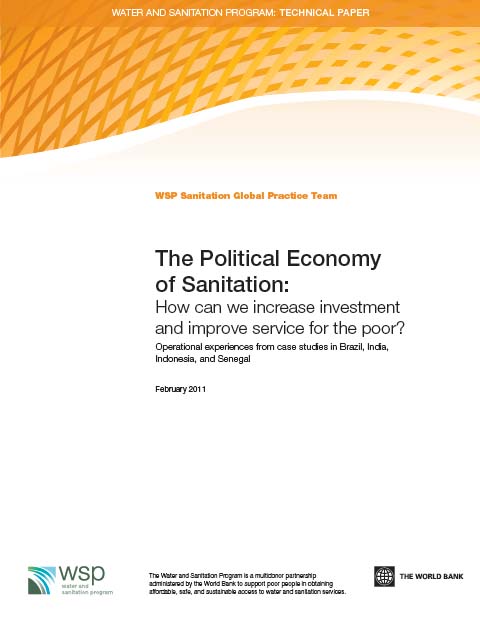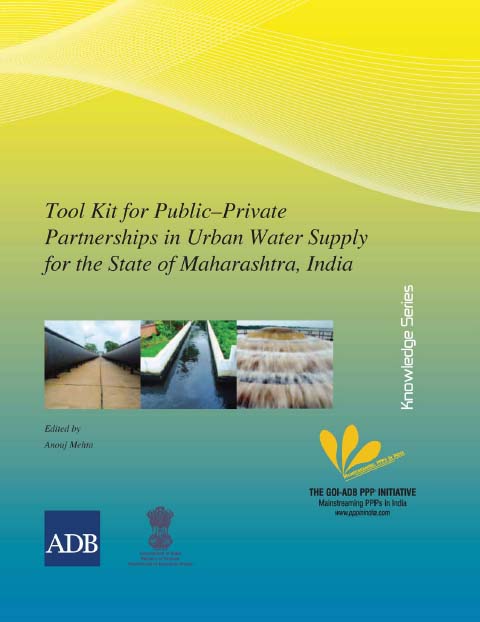/topics/public-infrastructure-and-services
Public Infrastructure and Services
Draft guidelines for taking up works relating to access to sanitation facilities by Ministry of Rural Development - Request for comments by August 15, 2011
Posted on 09 Aug, 2011 11:15 PMThe Ministry of Rural Development, Government of India has developed draft guidelines expanding the scope of works under schedule 1 Para 1 (ix) of Mahatma Gandhi National Rural Employment Guarantee Scheme to include access to sanitation facilities. This has been prompted by demands from several States/quarters for ensuring sanitation facilities in rural areas with the main goal of ensuring a clean environment, thereby bringing about an improvement in the general quality of life and strengthening the livelihood base.
Delhi Water Privatization - WASH News and policy update
Posted on 03 Aug, 2011 06:20 PMContent courtesy: India WASH Forum
Sustainable Development Framework for the mining sector in India – A report by the Ministry of Mines
Posted on 29 Jul, 2011 01:03 PM It does this in light of the recommendations of the Anwarul Hoda Committee, a High Level Committee set up by the Planning Commission in 2005. The draft SDF prepared by ERM India Pvt. Ltd. for the Ministry of Mines was released recently for seeking public comments before its formal adoption. It presents a set of guiding principles for the mining sector in India, which aims at achieving resource efficiency, business viability and environment stewardship around development of affected communities.
It does this in light of the recommendations of the Anwarul Hoda Committee, a High Level Committee set up by the Planning Commission in 2005. The draft SDF prepared by ERM India Pvt. Ltd. for the Ministry of Mines was released recently for seeking public comments before its formal adoption. It presents a set of guiding principles for the mining sector in India, which aims at achieving resource efficiency, business viability and environment stewardship around development of affected communities.
The political economy of sanitation - How can we increase investment and improve service for the poor? – A report by Water and Sanitation Program
Posted on 26 Jul, 2011 02:53 PM This global study attempts systematically to understand and thus help practitioners manage the political economy of pro-poor sanitation investments and service provision.
This global study attempts systematically to understand and thus help practitioners manage the political economy of pro-poor sanitation investments and service provision.
It aims to provide practical advice to multi-lateral agencies and sanitation practitioners to help them better manage stakeholder relations and effectively maneuver within the complex institutional relationships of the sanitation sector in order to enhance the design, implementation, and effectiveness of operations that provide pro-poor sanitation investments and services. The ultimate goal is to improve health and hygiene outcomes.
This study follows current approaches to political economy - interdisciplinary inquiry drawing upon social and political theory and economic principles - to understand how political actors, institutions, and economic processes influence each other. This study’s conceptual framework combines a diagnostic component with a typology of actions to help translate analytical findings into more effective support to operations and investments.
Guidelines of the Central Rural Sanitation Programme and Total Sanitation Campaign by the Department of Drinking Water and Sanitation (2011)
Posted on 25 Jul, 2011 07:30 PMThis document by the Department of Drinking Water and Sanitation deals with the guidelines of the Central Rural Sanitation Programme (CRSP) and Total Sanitation Campaign (TSC). India’s first nationwide programme of rural sanitation, the CRSP was launched in 1986, while TSC was launched in 1999 with the aim of ending open defecation.
Fazilka citizens protest against planned encroachment on ecosensitive Badha lake wetland by Punjab Urban Development Authority (PUDA)
Posted on 21 Jul, 2011 04:16 PMForwarded to the portal by: Graduates Welfare Association, Fazilka
Public-Private Partnerships in urban water supply for Maharashtra – Tool kit by GoI-ADB PPP Initiative
Posted on 16 Jul, 2011 06:48 PM
The various possible PPP structures for the sector were studied, and their applicability assessed in the context of the selected sample cities. Consultations led to development of term sheets for these PPP structures, which were identified as most suitable and feasible for implementation.
The above exercise has led to development of this report, which may be considered as a tool kit designed to help decision makers decide whether a particular project might be suitable for the PPP route or not. The tool kit can, therefore, be the basis for approving a project implementation structure as part of the overall project approval methodology.
National Water Policy - An alternative draft for consideration by Ramaswamy R Iyer - Economic and Political Weekly
Posted on 10 Jul, 2011 08:31 AMThe paper sets forth for consideration a broad national perspective on the nature of water and on its prudent, wise, sustainable, equitable and harmonious use. The Ministry of Water Resources is at present engaged in revising the National Water Policy 2002. Iyer is of the opinion that instead of trying to make changes in the 2002 Policy, the Ministry should put it aside and draft a new policy, starting from first principles.
Groundwater governance in India – A case study by World Bank
Posted on 09 Jul, 2011 11:43 AMIt examines the impediments to better governance of groundwater, and explores opportunities for using groundwater to help developing countries adapt to climate change. It attempts to understand the practical issues that arise in establishing robust national governance frameworks for groundwater and in implementing these frameworks at the aquifer level.
The case study focused on the national, state and local levels. At the national and state levels, it analyzed the policy, legal, and institutional arrangements to identify the demand and supply management and incentive structures that have been established for groundwater management. At the local level, it assessed the operations, successes, and constraints facing local institutions in the governance of a number of aquifers within peninsula India, on the coast and on the plain of the Ganges river valley.
The lake and the well, part of a water master plan - Article by S. Vishwanath about Jakkur Lake in Bangalore
Posted on 28 Jun, 2011 05:41 PMAuthor: S. Vishwanath
Video courtesy: Zenrainman
When a city adds nearly 3 million people in a span of a decade ensuring water supply to its citizens seems a huge challenge. One critical thing to realize is that the mind-set of ‘providing’ water has to change and become one of ensuring that citizens can access water of requisite quality.





